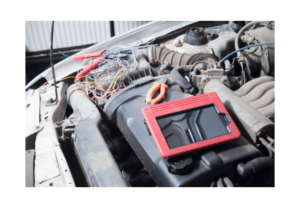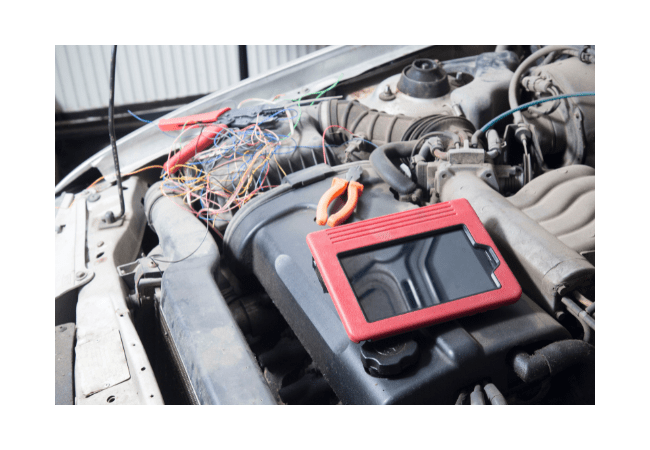An engine tuner is a device that allows you to modify the performance of your vehicle’s engine. It works by adjusting various parameters such as fuel injection timing, air/fuel ratio, and ignition timing. There are several types of engine tuners available in the market including handheld, plug-in, and custom tuners. Each type has its own set of features and capabilities. But do engine tuners really work – find out in the following article.
The primary goal of an engine tuner is to improve the overall performance of your vehicle. This includes increasing horsepower and torque output, improving acceleration and throttle response, and enhancing fuel efficiency. Engine tuners are popular among car enthusiasts who are looking for ways to customize their vehicles and get the most out of them.
It is important to know if engine tuners really work before investing in one. While there are many claims about the effectiveness of these devices, it is important to understand that results can vary depending on several factors such as the type of tuner used, vehicle make and model, and driving conditions. Knowing whether engine tuners really work can help you make an informed decision about whether or not to invest in one for your vehicle.
Additionally, understanding how engine tuners work can help you avoid potential damage to your vehicle’s engine if not used properly. Tuning your engine without proper knowledge or experience could lead to costly repairs down the line or even void your vehicle warranty. By doing proper research beforehand and consulting with experts in the field, you can ensure that you choose a reputable tuner that will deliver safe and effective results for your specific needs.
Jump to
What Are Engine Tuners

An engine tuner is a device that allows you to modify the performance of your vehicle’s engine. It works by making adjustments to various parameters that control fuel delivery, ignition timing, and other settings within the engine management system. The goal is to optimize these settings for maximum power output, improved acceleration and throttle response, and better fuel efficiency.
There are three main types of engine tuners: handheld tuners, plug-in tuners, and custom tuning software. Handheld tuners are portable devices that plug into your vehicle’s OBD-II port and allow you to make adjustments on-the-fly. Plug-in tuners are similar but typically require more installation time and may offer more advanced features. Custom tuning software provides the most flexibility but requires technical knowledge and experience to use effectively.
An engine tuner works by modifying various settings within the engine management system. These can include things like fuel injection timing, air/fuel ratio, ignition timing, and more. By adjusting these settings, an engine tuner can improve power output by increasing horsepower and torque, improve acceleration and throttle response by reducing lag time between pedal input and actual response from the car, as well as optimize fuel efficiency by ensuring that the right amount of fuel is being delivered at all times.
To use an engine tuner effectively, it’s important to understand how these different settings work together to affect overall performance. This requires some technical knowledge about engines in general as well as specific knowledge about your particular vehicle’s make and model. With this understanding in place, however, an experienced user can fine-tune their vehicle for optimal performance under any driving conditions.
How Engine Tuners Work
The tuning process involves making adjustments to your vehicle’s engine management system in order to optimize its performance. This can be done using an engine tuner, which allows you to modify various settings that control fuel delivery, ignition timing, and other key parameters. The goal is to achieve a balance between power output, acceleration and throttle response, and fuel efficiency.
The tuning process typically begins by connecting an engine tuner to your vehicle’s OBD-II port. From there, you can access the engine management system and start making adjustments based on your specific needs and driving conditions. Depending on the type of tuner you are using, this may involve selecting pre-programmed settings or manually adjusting individual parameters.
Some of the most common adjustments made by an engine tuner include changes to fuel injection timing, air/fuel ratio, ignition timing, and throttle response. By fine-tuning these settings, it is possible to increase horsepower and torque output while also improving acceleration and overall responsiveness. Other adjustments may include tweaks to transmission shift points or traction control settings in order to improve handling and stability.
The impact of tuning on performance and fuel efficiency can vary depending on a number of factors including the make and model of your vehicle as well as your driving habits. In general, however, properly tuned engines tend to produce more power while using less fuel than their stock counterparts. This is because tuning allows for better combustion efficiency which translates into more power from each unit of fuel burned.
Another benefit of tuning is improved throttle response which makes for a more engaging driving experience. With faster acceleration times due to optimized power delivery from the tuned engine comes improved driver confidence when merging onto highways or overtaking slower vehicles on two-lane roads.
If done correctly with proper research beforehand and careful consideration given towards safety concerns such as maintaining proper cooling systems for high-performance modifications; tuning can provide substantial benefits in terms of both performance gains as well as increased fuel economy over time.
Benefits of Engine Tuning
Increased horsepower and torque
One of the primary benefits of using an engine tuner is the ability to increase horsepower and torque output from your vehicle’s engine. By fine-tuning various parameters such as fuel injection timing, air/fuel ratio, and ignition timing, you can optimize your engine for maximum power output. This means that you will be able to accelerate faster and reach higher speeds than you would with a stock engine.
Improved acceleration and throttle response
Another key benefit of tuning your engine is improved acceleration and throttle response. By optimizing the air/fuel mixture and ignition timing, you can reduce lag time between pedal input and the actual response from the car. This means that when you press down on the accelerator, your car will respond more quickly and smoothly than it would with a stock setup. This can make for a more engaging driving experience overall.
Better fuel efficiency
Contrary to popular belief, tuning your engine can actually improve fuel efficiency in some cases. By optimizing the air/fuel mixture and reducing unnecessary fuel consumption during acceleration or cruising speeds; less fuel is burned per mile driven which translates into better gas mileage over time. In addition, some tuners also allow for specific settings that adjust transmission shift points based on load conditions which can further improve gas mileage by keeping revs lower at cruising speeds.
Tuning your engine offers several key benefits including increased horsepower and torque output, improved acceleration and throttle response, as well as better fuel efficiency in some cases. It’s important to note however that proper research should be done before attempting any modifications as there are safety concerns involved such as maintaining proper cooling systems for high-performance modifications to avoid damage or failure of critical components such as pistons or bearings due to overheating caused by inadequate cooling solutions.
Do Engine Tuners Really Work
There is a growing body of evidence that supports the effectiveness of engine tuners in improving vehicle performance. Several studies have shown that properly tuned engines can produce significant gains in horsepower and torque output, resulting in faster acceleration times and higher top speeds. In addition, many users report improved throttle response and overall drivability after tuning their engines.
While there are many benefits to tuning your engine, it’s important to consider the limitations when evaluating results. One key limitation is that not all vehicles respond equally well to tuning. Some vehicles may require more extensive modifications than others in order to achieve significant gains in performance. Additionally, there may be trade-offs between performance gains and other factors such as fuel efficiency or emissions levels that need to be taken into account.
Many car enthusiasts have reported positive results after using engine tuners on their vehicles. For example, one user reported a 15% increase in horsepower and a 12% increase in torque output after installing an engine tuner on his Mustang GT. Another user noted significantly improved throttle response and smoother acceleration after tuning his Subaru WRX STI with an aftermarket ECU.
While there are some limitations to consider when evaluating the effectiveness of engine tuners, they do offer many benefits for those looking to improve their vehicle’s performance. Real-world examples from car enthusiasts who have successfully used these devices demonstrate their potential for making significant improvements to horsepower, torque output, acceleration times, and overall driving experience when done so safely with proper research beforehand.
Considerations Before Using an Engine Tuner
One of the most important factors to consider when deciding whether or not to tune your engine is vehicle compatibility. Not all engines are designed to handle the additional stress that can come with increased horsepower and torque output, so it’s important to research your specific make and model before making any modifications. Additionally, installing an engine tuner on your vehicle may void your manufacturer’s warranty, which could be costly if something goes wrong down the line.
Another key consideration when tuning your engine is the potential for damage if not done properly. Improper tuning can cause serious damage to critical components such as pistons, bearings, and valves due to overheating caused by inadequate cooling solutions. It’s important to work with a reputable mechanic or tuning shop that has experience with your specific make and model in order to avoid these types of issues.
Finally, it’s important to consider cost when deciding whether or not to tune your engine. Engine tuners themselves can range from a few hundred dollars up to the thousands depending on the complexity of the system and how extensively you plan on modifying your vehicle. In addition, there may be additional costs associated with installation and ongoing maintenance in order to keep your engine running smoothly after tuning.
While there are many benefits associated with tuning your engine including improved performance, better fuel efficiency, and throttle response; there are also several key considerations that need to be taken into account before proceeding. These include vehicle compatibility and warranty implications as well as potential damage if not done properly along with cost considerations both during installation as well as ongoing maintenance costs over time which should all be researched thoroughly beforehand.
DIY vs Professional Tuning
When it comes to tuning your engine, there are two primary approaches: DIY tuning or professional tuning. Each approach has its own pros and cons to consider. DIY tuning can be a more cost-effective option and allows you to have greater control over the process, but it also requires a significant amount of knowledge and experience in order to do it safely and effectively. Professional tuning, on the other hand, is typically more expensive but offers the benefit of working with experienced mechanics who have access to advanced diagnostic tools and equipment.
If you choose to attempt DIY engine tuning, safety should be your top priority. Tuning an engine involves making adjustments that can significantly affect performance and power output, so it’s important to proceed with caution. One key safety consideration is ensuring that you’re using high-quality parts that are designed for your specific vehicle make and model. Additionally, you’ll need to carefully research the proper procedures for making adjustments such as adjusting fuel maps or ignition timing in order to avoid causing damage or creating unsafe operating conditions.
When deciding whether or not to tune your engine, it’s important to weigh the pros and cons of each approach carefully along with taking into account any safety considerations involved if choosing a DIY approach. Ultimately, whether you decide to go with professional tuning or attempt DIY tuning will depend on factors such as your level of experience with engines along with budgetary concerns while always keeping safety at the forefront throughout any modifications made.
Conclusion
Engine tuners can be a powerful tool for improving the performance and efficiency of your vehicle’s engine. By adjusting factors such as fuel maps and ignition timing, an engine tuner can help to optimize your engine’s output while also reducing emissions and improving fuel economy. There is ample evidence to support the effectiveness of engine tuners, with many users reporting significant improvements in horsepower, torque, and overall driving experience.
However, before using an engine tuner it’s important to consider several key factors including compatibility with your specific make and model, warranty implications, the potential for damage if not done properly along with cost considerations both during installation as well as ongoing maintenance costs over time. Additionally, those who choose to attempt DIY tuning should take into account the safety considerations involved which may require a significant amount of knowledge and experience in order to do it safely and effectively.
Ultimately, whether you decide to go with professional tuning or attempt DIY tuning will depend on factors such as your level of experience with engines along with budgetary concerns while always keeping safety at the forefront throughout any modifications made. Whichever approach you choose, however, by carefully considering all of these factors beforehand you can ensure that you’re making an informed decision that will help you get the most out of your vehicle’s engine while also ensuring safe and effective operation over the long term.

My name is Tom Harris, founder of this blog. I’m a mechanical engineer with 20 years of experience in the automotive industry. I’m here to help you with your vehicle’s problems, easy fixes and share my insights and experience so that you can enjoy your rides more.

